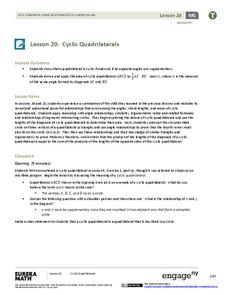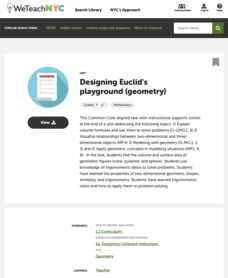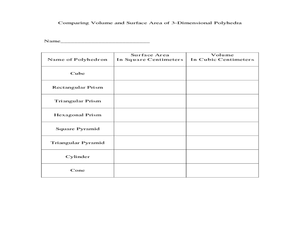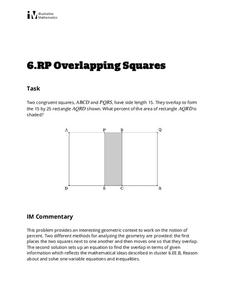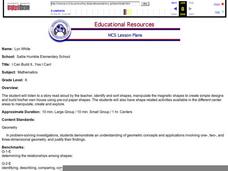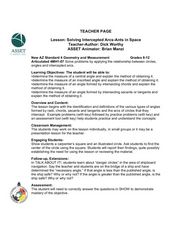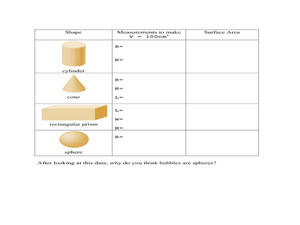EngageNY
Cyclic Quadrilaterals
What does it mean for a quadrilateral to be cyclic? Mathematicians first learn what it means for a quadrilateral to be cyclic. They then investigate angle measures and area in such a quadrilateral.
Curated OER
Effects of Changing Dimensions Proportionally
In this geometry worksheet, students describe the effect of a proportional change on the perimeter or circumference and area of the given circles or quadrilaterals. The one page worksheet contains ten problems. Answers are included.
New York City Department of Education
Designing Euclid’s Playground
Create a geometric playground. Pupils work through a performance task to demonstrate their ability to use geometric concepts to solve everyday problems. The accompanying engineering design lessons show teachers how the assessment works...
Curated OER
Secants, Tangents and Arcs
Students identify chords and angles. For this geometry lesson, students calculate the length of the chords inside and outside of-the circle. They differentiate between tangent and secant lines.
Curated OER
The Value of Volume
Students measure the perimeter and area of their polygons. In this geometry instructional activity, students calculate the volume and area using the correct tools. They calculate the time and temperature and the perimeter and side...
Curated OER
Miami Metrozoo & Mathematics
Twelfth graders use Algebra and Geometry to solve a real life problem at the Zoo.
Curated OER
Triangles with Collinear Circumcenters
Students identify the circumcenter of a triangle. In this geometry lesson, students construct a perpendicular bisector using a straight edge and a compass. They differentiate between triangles and collinear points.
Curated OER
Find Radius/Diameter
In this geometry worksheet, students calculate the radius and the diameter of the five given circles. There is an answer key included.
Curated OER
Segments Formed by Intersectiong Chords, Secants, and Tangents
Learners investigate the properties of segments formed which chords, secants, and tangents, intersect. The dynamic nature of Cabri Jr. allows students to form and verify conjectures regarding segment relationships.
Curated OER
Sectors of Pizza
Students identify the properties of a circle. In this geometry activity, students relate properties of diameter to sections of a pizza. They calculate the measure of an arc and missing angles.
EngageNY
Ptolemy's Theorem
Everyone's heard of Pythagoras, but who's Ptolemy? Learners test Ptolemy's Theorem using a specific cyclic quadrilateral and a ruler in the 22nd installment of a 23-part module. They then work through a proof of the theorem.
EngageNY
Complex Numbers and Transformations
Your learners combine their knowledge of real and imaginary numbers and matrices in an activity containing thirty lessons, two assessments (mid-module and end module), and their corresponding rubrics. Centered on complex numbers and...
Illustrative Mathematics
Overlapping Squares
The objective of this activity is to find the percent of the area of a two squares overlapping. Mathematicians find the ratio of area for the part that overlaps to the rectangle formed. The final answer is a percent as a rate per 100....
EngageNY
General Pyramids and Cones and Their Cross-Sections
Are pyramids and cones similar in definition to prisms and cylinders? By examining the definitions, pupils determine that pyramids and cones are subsets of general cones. Working in groups, they continue to investigate the relationships...
Curated OER
I Can Build It.....Yes I Can!
Kindergartners listen to a story read by their teacher, then use magnetic shape pieces to construct simple designes. They "build" their own house using pre-cut paper shapes. This age-appropriate lesson would be an excellent choice for...
Curated OER
Geometric Figures
Students compare, classify and calculate the area of geometric figures such as rectangles, squares, circles and triangles.
Curated OER
Math and Circumference
Sixth graders explore geometry by utilizing mathematical formulas. In this circumference activity, 6th graders identify the difference between diameter, circumference and radius in a circle. Students review the formulas for finding...
Curated OER
"Where Does Pi Come From?"
Fifth graders explore geometry by exploring Pi. For this circle measurement lesson, 5th graders identify the relationship between the radius, diameter and circumference of a circle and how Pi is the key to unlocking any circular...
Curated OER
Solving Intercepted Arcs
Students investigate circles and its arcs. In this geometry lesson, students identify the relationship between an circle and its intercepted arcs. THey identify the central and inscribed angles.
Curated OER
Measurement
Seventh graders measure surface area. In this geometry lesson, 7th graders find the surface area of various geometrical shapes. Using a computer program, students compute the area of 2-D and 3-D shapes. Students use graph paper to trace...
Curated OER
Troublesome Towers
Students observe solids and identify parts that make up the surface area. For this geometry lesson, students calculate the surface are of solids and cones. They find polygons and solids in the real world.
Alabama Learning Exchange
It's Around There Somewhere! Perimeter, and Circumference
Explore the concept of building equations for perimeter and circumference. Learners use rulers to measure the perimeter of half a sheet of paper. Then fold the sheet of paper numerous times, each time measuring perimeter. Learners use...
Curated OER
Why are Bubbles Spheres
Students calculate the surface area of different polygons. In this geometry lesson, students practice calculating the volume of spheres. They work with cones, cylinders and rectangular prisms.
Curated OER
Volume of a Cylinder
Middle and high schoolers calculate the volume of cylinders. They measure the height, radius and diameter of cylinders. Following given formulas, learners calculate the area and volume of the cylinder. They compare cylinders and predict...


